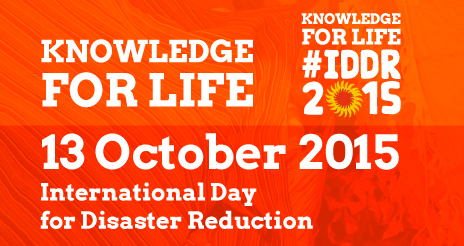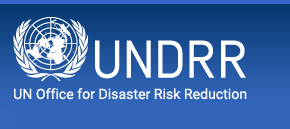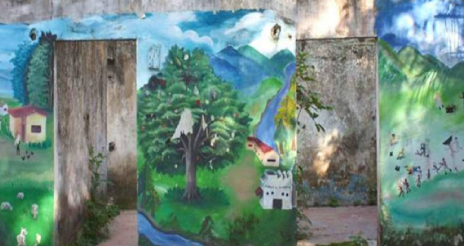- Our Mandate
- Mission and Objectives
- UNDRR in the UN
- Work Programme & Annual Reports
- Results Based System
- Work Partnerships
- Headquarters - Geneva
- SG-UN representatives for DRR
- Regional Office – The Americas and the Caribbean
- Head of the Regional Office – The Americas and the Caribbean
- What is Disaster Risk Reduction?
- What is the International Strategy?
- History of UNDRR
USAID/OFDA Newsletter: Investing in a resilient future for Latin America
By: UNDRR - Americas
PANAMA CITY, Panama, December 24, 2014 - In its December newsletter, the Office of U.S. Foreign Disaster Assistance of the United States Agency for International Development (USAID/OFDA) highlights its disasters risk reduction (DRR) projects in vulnerable areas of Haiti, Peru, Jamaica and Colombia, which were recently awarded US$ 9.6 million.
Through various of projects implemented by non-profit organizations, USAID/OFDA donations seek to increase the resilience of residents living in marginalized metropolitan areas exposed to natural and man-made disasters, including earthquakes, storms, floods, landslides, and other hazards exacerbated by the elevated growth rate of cities in Latin America and the Caribbean (LAC).
“It is critical, in a region as seismically active as this one, to look at urban DRR issues. We have seen first-hand the impact that disasters can have in places like Haiti, Peru, Guatemala… the list goes on,” said USAID/OFDA Senior Regional Advisor Tim Callaghan during a recent meeting to launch the projects, held October 30 and 31 in Lima, Peru.
Urban DRR projects recently initiated and supported by USAID/OFDA/LAC include:
- Haiti: GOAL is working to reduce urban disaster risk, increase resilience, and mitigate geological and hydro-meteorological hazards through expanding and embedding the ‘neighborhood approach’ in five high-risk neighborhoods of Port-au-Prince, home to approximately 23,500 residents. USAID/OFDA contributed $750,000 to the 18-month project.
Meanwhile, Cooperazione Internazionale is working to reduce potential impacts of geological and hydro-meteorological hazards to benefit approximately 22,500 residents. USAID/OFDA provided approximately $750,000 to support the 12-month project.
Finally, Global Communities is working to mitigate potential impacts of geological and hydro-meteorological hazards in the vulnerable Christ-Roi, Cité Choune, and Ravine Pintade neighborhoods straddling the Nicolas ravine in Port-au-Prince. USAID/OFDA provided $750,000 to the 12-month project, which aims to benefit at least 35,000 individuals.
- Peru: The Center for Disaster Studies and Prevention (PREDES) is helping private-sector and government entities to develop, validate, and disseminate earthquake-resistant building techniques to approximately 19,000 project beneficiaries. USAID/OFDA provided nearly $1.3 million to support the 30-month project.
- Jamaica: Habitat for Humanity is helping Gregory Park, Newlands, and Naggo Head neighborhoods of Portmore Municipality, Jamaica, to address hazards including frequent hurricanes and tropical storms to develop business incentives for vulnerable residents. USAID/OFDA provided approximately $1.4 million to the 33-month project, which aims to benefit nearly 65,000 individuals.
- Colombia: Global Communities is using a $1.7 million USAID/OFDA grant to promote community and private- and public-sector engagement in reducing social and economic impacts associated with frequent landslides, earthquakes, flooding, and fires in four highly vulnerable mountain neighborhoods of Medellín. The 21-month project aims to benefit more than 56,000 individuals.
Regarding Colombia, the newsletter also mentions the results USAID/OFDA-supported trainings, including the case of three trapped miners who were heroically rescued by community residents of Quinchia, Department of Risaralda, who had received training through the American Red Cross which was backed by USAID/OFDA.
Furthermore, through its Regional Disaster Assistance Program (RDAP), USAID/OFDA recently held an urban search-and-rescue (USAR) exercise methodology workshop with disaster response and national emergency system representatives from 10 countries in Central and South America. The aim of the workshop, held in Panama City, Panama, was to design and develop a model urban USAR-exercise guide for response institutions.
Related links:
See December 2014 USAID/OFDA newsletter (PDF)
Follow the UNDRR news online:
 International Day for Disaster Reduction #DIRD 2015 Knowledge for Life
International Day for Disaster Reduction #DIRD 2015 Knowledge for Life
More information

